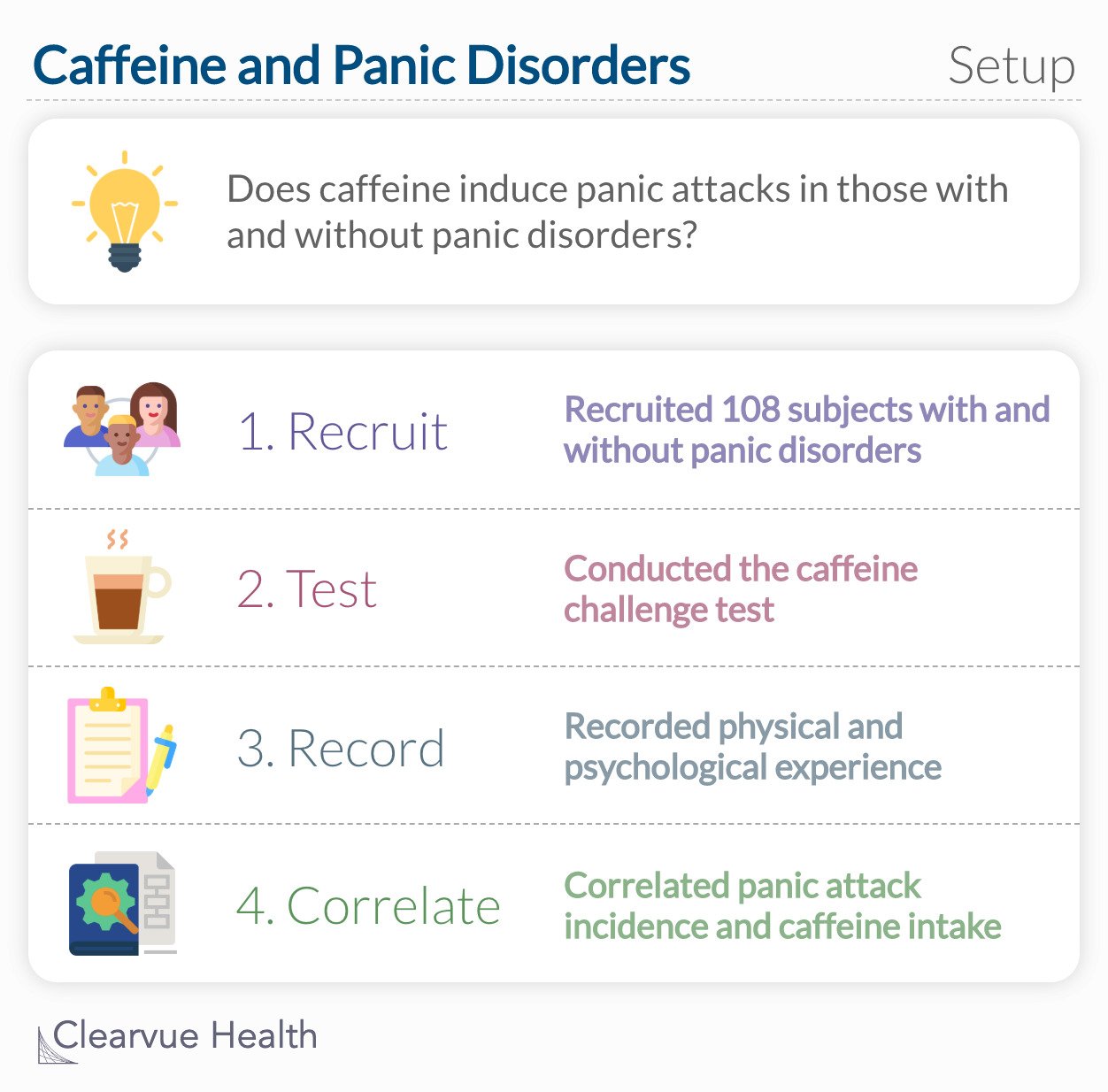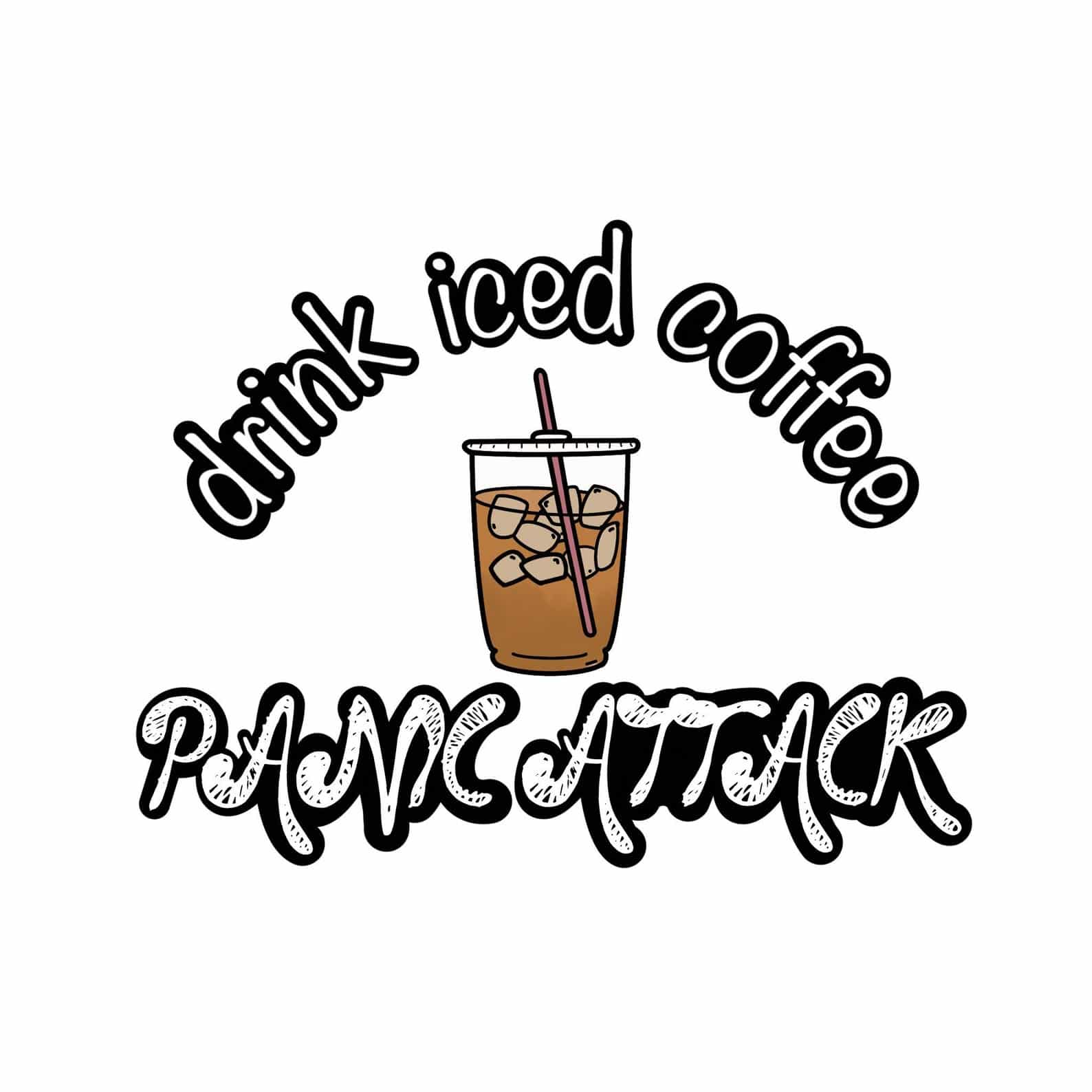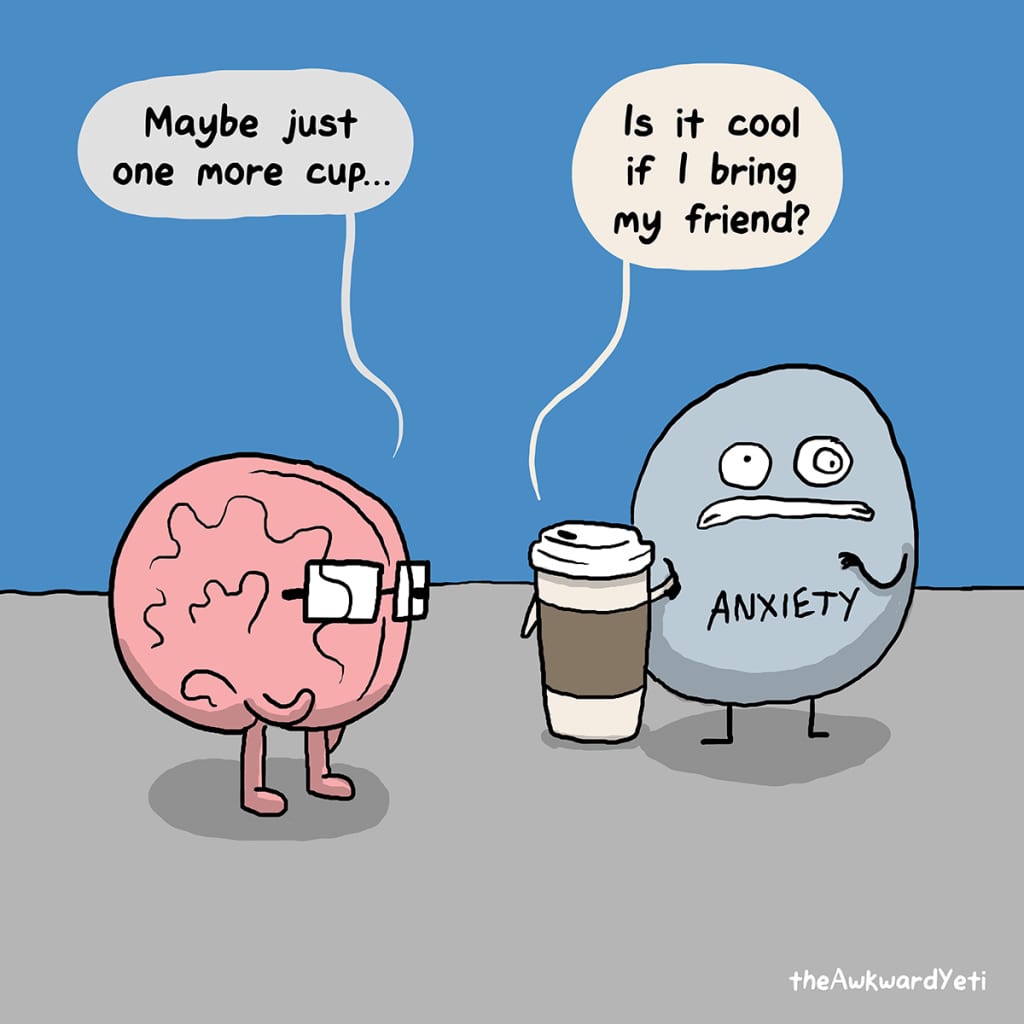The Link Between Caffeine And Anxiety
Read any website with tips on how to control anxiety and you’ll find countless people saying that removing caffeine will greatly reduce your anxiety. This may be misleading as it seems to suggest that anxiety is caused by caffeine. However, there is a link between anxiety and caffeine. Extremely large quantities of caffeine may induce bouts of anxiety but in general to create anxiety where it is not already present the volume of caffeine necessary is unlikely to be consumed.
For people who already have frequent anxiety, caffeine can certainly exacerbate the symptoms. The effects of caffeine can mimic the symptoms of anxiety which for a person with an anxiety disorder, may actually create anxiety about the thought of having anxiety symptoms.
Exercise May Help Reduce Caffeine
Additional research from the Department of Psychiatry, University of California, San Diego3 found that regular exercise seems to lessen the degree to which caffeine heightens anxiety levels in those prone to anxiety.
In this study, researchers exposed a group of anxiety-prone men to both 60 minutes of cycling and 60 minutes of quiet rest after the administration of 800 mg of caffeine and then evaluated their level of anxiety after each test.
They found that rest did not have any effect on decreasing the level of anxiety reported, but the exercise did significantly reduce the level of anxiety reported by the participants.
So, the bottom line here is that exercise could lessen the degree to which caffeine causes increased anxiety in those already prone to problems with anxiety.
References
- Alsene, K., Deckert, J., Sand, P., & de Wit, H. . Association between A2a receptor gene polymorphisms and caffeine-induced anxiety. Neuropsychopharmacology, 28, 1694-1702. Study pdf
- Charney, D. S., Heninger, G. R., & Jatlow, P. I. . Increased anxiogenic effects of caffeine in panic disorders. Archives of General Psychiatry, 42, 233-243. Study link
- Youngstedt, S. D., OConnor, P. J., Crabbe, J. B., & Dishman, R. K. . Acute exercise reduces caffeine-induced anxiogenesis. Medicine and science in sports and exercise, 30, 740-745. abstract
What Is A Panic Attack
A panic attack is a brief episode of intense anxiety, which causes the physical sensations of fear. These can include a racing heartbeat, shortness of breath, dizziness, trembling and muscle tension. Panic attacks occur frequently and unexpectedly and are often not related to any external threat. A panic attack can last from a few minutes to half an hour. However, the physical and emotional effects of the attack may last for a few hours. Panic attacks are common. Up to 35% of the population experience a panic attack at some time in their lives. A panic attack can also be called an anxiety attack. Without treatment, frequent and prolonged panic attacks can be severely disabling. The person may choose to avoid a wide range of situations for fear of experiencing an attack.
Dont Miss: Can Depression Make You Lose Your Appetite
You May Like: Can Emotional Abuse Cause Ptsd
How To Deal With Panic Attacks
A panic attack is a feeling of sudden and intense anxiety.
Panic attacks can also have physical symptoms, including shaking, feeling disorientated, nausea, rapid, irregular heartbeats, dry mouth, breathlessness, sweating and dizziness.
The symptoms of a panic attack are not dangerous, but can be very frightening.
They can make you feel as though you are having a heart attack, or that you are going to collapse or even die.
Most panic attacks last somewhere from five minutes to half an hour.
Can Social Support Help Cancer Patients Going Through Treatment

Questions on #vitamind
Questions on #antioxidants
Questions on #vitamine
You May Like: Is Bipolar And Manic Depression The Same
Okay So How Much Caffeine Is Too Much
According to the experts, a typical dose of 400 milligrams per day is more than enough. Note that if you are pregnant, keep doses to less than 200 milligrams daily . Having too much of this powerful stimulant can put you at risk for having symptoms like fast, irregular heartbeats, and muscle tremors.
If you do happen to go a wee bit overboard on the caffeine, dont panic. Just stop drinking your caffeinated beverage and replace it with lots of H2O to rehydrate. One cup of water to one cup of coffee or one 8 oz. energy drink is a good ratio. Then, take a walk to shake off the caffeine and help ease some of that restlessness.
Dont Miss: Prodromal Symptoms Of Schizophrenia Are Evident
Caffeine Robs You Of Essential Brain Nutrients
Caffeine causes nutrients to be excreted from your body, some of which are particularly important for your brain health and mood.
One of the nutrients that gets depleted is magnesium, a mineral that has profound effects on your mental wellness.
Magnesium plays a critical role in a number of brain-related disorders including:
Anxiety is a common sign of B vitamin deficiency.
Taking extra B vitamins can address imbalances of the brain chemicals GABA, serotonin, dopamine, and epinephrine that contribute to anxiety.
Don’t Miss: What To Say To Someone In A Panic Attack
What About Caffeine And Stress
Caffeine affects how our bodies produce adenosine, adrenaline, dopamine, and cortisol. Usually, caffeine inhibits our bodys ability to absorb adenosine . At the same time, it increases the production of cortisol, norepinephrine, epinephrine, adrenaline, and dopamine. As a result, caffeine consumption may lead to feelings of stress. If one continually drinks high amounts of caffeine- it can lead to elevated levels of cortisol which can mimic feelings of chronic stress.
Can Caffeine Make Anxiety Worse
According to Wolkin, research indicates that caffeine can aggravate and maintain an anxiety disorder. The impact of coffee can be so pervasive and play such a clear role in exacerbating someones anxiety that she asks all new patients about their caffeine consumption.
If she later notices that coffee is intensifying, or helping to maintain, some of the anxiety a person is experiencing, she recommends weaning off slowly in conjunction with their therapeutic work.
But what are the symptoms of anxiety? Anxiety is a feeling of intense, persistent, and/or difficult-to-manage worry, dread, or fear regarding everyday circumstances and situations, says Amie DiTomasso, L.G.S.W., a therapist atThe Dorm. Anxiety not only impacts your mental state, but it has physical symptoms too, including dizziness, nausea, shortness of breath, muscle tension, and difficulty breathing, she explains.
But the symptoms of anxiety and too much caffeine can overlap, Prest warns. You may feel a rapid heartbeat, gastrointestinal distress, restlessness, and other symptoms that feel very similar, so it can be difficult to distinguish the two if youre already someone who experiences anxiety, she says.
You May Like: Where Are Eating Disorders Most Common In The World
Genetics And Variability Of Caffeine Consumption
While many factors contribute to individual differences in a person’s response to caffeine, such as environmental and demographic factors , genetics play an important role in individual variability. This inconsistency in responses to caffeine can take place either at the metabolic or at the drug-receptor level. The effects of genetic factors can occur either directly by changing acute or chronic reactions to the drug or indirectly by altering other psychological or physiological processes.
Some of these processes include wakefulness, stimulation, and mood and cognition enhancement. Low doses can result in psychological effects of “mild euphoria, alertness, and enhanced cognitive performance” higher doses produce physiological side effects of nausea, anxiety, trembling, and jitteriness.
There are individuals who are prone to caffeine’s anxiogenic effects whilst others are susceptible to its caffeine-induced sleep disturbances and insomnia. Studies with twins have shown that genetics influence individual differences in response to caffeine. Homozygous twins have been found to react in more consistent ways to the caffeine than heterozygous twins.
Pregnancy And Postpartum Hormonal Changes
The hormonal changes that occur during pregnancy and after childbirth can trigger panic attacks. This is because these hormones can cause changes in the brain that make it difficult to cope with stress. It also happens because pregnancy and postpartum can be stressful life events that can lead to changes in routine, which can be difficult for the mind and body to adjust to.
You May Like: Which Phobia Do You Have
How Much Caffeine Decaf Coffee Contains
Depending on the coffee type, preparation process, and size of the cup, an average cup of regular coffee contains about 70140 mg of caffeine. On the other hand, every 6 ounces cup of decaf contains 07 mg of caffeine, according to a study.
Yes, decaf coffee contains caffeine but the amount is itty-bitty.
Read Also: What Is Standard Coffee Table Height
Why Does Coffee Give Me Anxiety Now

There is no one definitive answer to this question. However, it is speculated that coffee may cause anxiety due to the fact that it is a stimulant. Stimulants can increase anxiety levels by causing the body to release adrenaline. Additionally, coffee can also cause jitters and nervousness, which can lead to anxiety.
Anxiety and jitteriness can be caused by drinking coffee. Coffee contains caffeine, which helps us feel energized and awake for the day. Coffee, according to a nutritional expert, not only contains caffeine, but it also contains vitamin D, an acid, and a diuretic. Caffeine can cause headaches, fatigue, decreased energy, drowsiness, depressed mood, and irritation, among other things. Arvind Kapoor, a dietitian, recommends replacing coffee with healthy alternatives such as water, jal jeera, tender coconut water, warm water, honey and lemon, buttermilk, or any other healthy snack.
Even when consumed in moderation, caffeine can raise anxiety and lower mood, despite the fact that it is widely available in small amounts. It is critical for people with clinical anxiety disorder to work with their doctor to figure out how caffeine affects their overall well-being in order to develop a more comprehensive treatment plan. All three experts agree that drinking coffee can help you feel better when you are stressed.
Don’t Miss: How To Tell If You Bipolar
What About Sugar In Coffee
So you dont take your coffee black and need a little sweetness in your life? Sugar and other artificial sweeteners are similar to caffeine in that it cant cause anxiety, but can worsen anxiety symptoms. It is best to stay away since they can cause effects such as fatigue , blurry vision, and upset stomach. These side effects can lower your mood which just contributes to anxiety.
Also Check: The Fear Of Spoons
Its Easier Than Ever To Overdo Caffeine Consumption
There are more sources of caffeine than ever before.
You expect to find it in coffee, tea, chocolate, and cola soda, but its also hidden in prescription drugs, over-the-counter painkillers, non-cola drinks, vitamin waters, brain tonics, and even in vitamins and herbal supplements.
Caffeine is commonly added to so-called brain supplements, often as part of a proprietary blend which means that the label doesnt tell you how much caffeine the supplement contains.
The amount of caffeine in energy drinks can be deceiving since some of the serving sizes of these drinks are so small.
5-Hour Energy Shot contains a jaw-dropping 100 mg of caffeine per ounce.
Another problem is that labels arent always accurate.
Sunkist orange soda lists 41 mg of caffeine on its label, but in fact, was found to have almost six times as much caffeine at 240 mg per bottle.
Caffeines effects are consistently underestimated.
According to the book Caffeinated, heres what escalating amounts of caffeine can do to you:
- 1/64 teaspoon will give you a subtle boost
- 1/16 teaspoon can lead to addiction
- 1/4 teaspoon causes acute anxiety
- 1 tablespoon is enough to kill an adult
Its thought to be virtually impossible to drink yourself to death with naturally occurring caffeine.
But now, pure caffeine pills and powder can easily and inexpensively be purchased online, making caffeine overdose a reality.
Sadly, there have been numerous deaths caused by caffeine powder overdose.
Read Also: Where Are Bipolar Neurons Found
Don’t Miss: How To Overcome Anxiety Social Phobia And Depression
Exactlyhowanointedsmiledrops Stress Panic Attacks Work Naturally
AnointedDropsdesignerclarifiesthatthisoptioncontainstheappropriateingredientstoboostyourstateofmind,thusreducingstressandanxiousnessWhatsmore,Smileactiveingredientsgetabsorbedstraightintothebloodstreamthereforebypassingthedigestionsystementirely.
Furthermore,greasySmiledropshaveapositivetasteaswellastaste therefore,individualswilldiscoverthemsimpletoeat.Lastly,theSmilenutritionalsupplementclaimsyourmoodswillgetliftedafterusingthisproductregularly.
Caffeine And Anxiety Make You Feel Jittery And Nervous
Caffeine is a stimulant and that can be bad news for someone with anxiety. Caffeine’s jittery effects on your body are similar to those of a frightening event. That’s because caffeine stimulates your fight or flight response, and research has shown that this can make anxiety worse and can even trigger an anxiety attack.
Other research suggests that while caffeine can increase alertness, attention, and cognitive function, overdoing it can increase anxiety, particularly in people with panic disorder and social anxiety disorder. And as with the symptoms of anxiety, one too many cups of joe may leave you feeling nervous and moody, and can keep you up at night.
Also Check: What Are The Side Effects Of Depression
Mobilization Of Intracellular Calcium
At very high concentrations of about 12 mM, caffeine lowers the excitability threshold in muscle cells, leading to prolonged contraction. The introduction of such high doses of caffeine allows calcium to enter the muscle cell through the plasma membrane and sarcoplasmic reticulum more readily. Influx of calcium through the membranes in muscle cells requires at least 250 M of caffeine. Normally, other toxic effects of caffeine begin to occur in concentrations over 200 M, however average consumption averages lead to concentrations less than 100 M. This means that calcium influx and mobilization are most likely not the cause of caffeine’s effect on the central nervous system, and are therefore not the cause of caffeine-induced anxiety disorder.
Caffeine Induced Anxiety Symptoms
Increasing the bodys metabolic rate also increases heart activity and breathing rate. While this is clearly a benefit to someone looking for a boost of energy, these effects can be indistinguishable from an attack of anxiety to a sufferer of the disorder.
In fact, the symptoms of caffeine consumption mirror the symptoms of anxiety:
- Fast heart rate
- Gastrointestinal problems
Those who feel anxious after a cup of coffee are often conflating the effects of the caffeine with the familiar feelings of anxiety.
You May Like: Is Ptsd A Severe Mental Impairment
Bottom Line: Embrace Caffeine In Moderation But Stay Aware
What if you cant imagine life without that morning mug of coffee? Like so much in nutrition, caffeine can be a used in moderation type of fix.
Dr. Nagelkirk says staying under 400 milligrams per day is a good target, which is still a robust amount the U.S. Department of Agriculture notes that one 8-ounce cup of brewed coffee has 96 mg but also to stay aware of how it affects you.
You can also dial back by choosing a less-caffeinated options, like black or green tea. The Mayo Clinic puts one 8-ounce cup of black tea at 47 mg and an 8-oz cup of green tea at 28 mg.
Its worth noting that more research is needed to determine exact effects and dosage that may be causing adverse effects. Also, some people are genetically predisposed to be hypersensitive to caffeine, so their recommended amount may be different from someone without this predisposition. Thats another area where more research would be helpful.
That said, if youre struggling with any of the issues on this list, try cutting out the jump juice and see if it brings some relief. And get your blood pressure and cholesterol checked, too.
Recommended Reading: How Does Schizophrenia Affect Families
Quick Answer: Can Coffee Cause Anxiety Attack

Caffeine and Anxiety Make You Feel Jittery and Nervous Caffeines jittery effects on your body are similar to those of a frightening event. Thats because caffeine stimulates your fight or flight response, and research has shown that this can make anxiety worse and can even trigger an anxiety attack.
Also Check: How To Heal From Ptsd From Narcissistic Abuse
Prevention Of Panic Attacks
You cant prevent panic disorder, but you may be able to prevent panic attacks by learning what your personal triggers are.
You can also help reduce the frequency and severity of panic attacks with the following lifestyle modifications, per MedlinePlus:
- Get enough sleep
- Reduce or avoid caffeine, certain cold medicines, and stimulants
According to the Cleveland Clinic, these tips can also reduce your chances of having a panic attack:
- Eat a healthy diet.
- Talk to your doctor before taking herbal supplements or over-the-counter medications, because certain substances can increase anxiety.
Getting treatment for panic attacks as soon as possible can prevent them from getting worse or happening more often. Its also important to follow your treatment plan to prevent relapses and keep your symptoms from getting worse.
Editors Picks
Keeps Wrinkles At Bay For Longer
There are many factors when it comes to development of wrinkles, but a big one is how well your body can continue making collagen, a protein that provides structure to skin, as well as tendons and ligaments, according to previous research. As we age, our collagen production decreases naturally, research notes, which can affect skin resiliency, elasticity, and hydration. What speeds up that process? Too much UV light, tobacco, excessive sugar intake, and surprisingly, a large amount of caffeine.
As research has shown, caffeine actually interferes with collagen synthesis, says Los Angeles-based registered dietitian Melissa Hooper. When collagen stores begin to decline, which occurs around age 30, it creates wrinkles. Cutting out caffeine is a simple and inexpensive dietary change that can be done to support collagen stores and help delay wrinkles.
Also Check: How To Get Over A Needle Phobia Fast